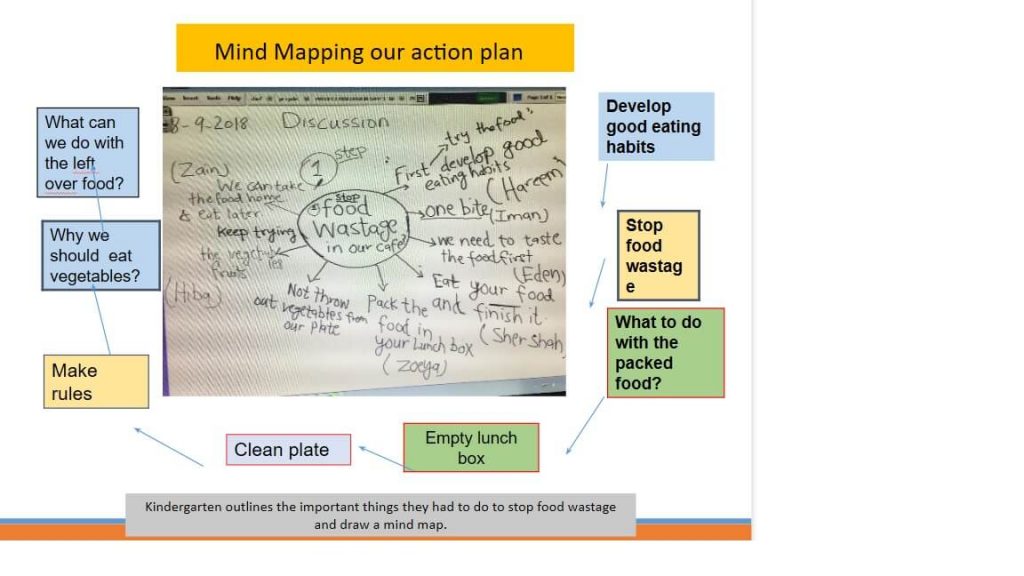
Pakistan Kindergarteners Tackle Food Waste
Over the past few years TeachThought PD has worked with educators from TNS Beaconhouse school in Lahore, Pakistan on PBL professional learning. Deputy Head, Kanwal Babar Malik was gracious enough to share the story of one of their recent project-based learning classroom experiences.
What I like about this learning journey is the evidence of the ‘pull teaching’ dynamic that we emphasize in our work with school as teachers helped pull the learning goals from students in the form of ‘Need to Know and Learn’ questions. From there they were able to engage in teaching and learning of that content in ways that students connected with deeply.
Drew Perkins, Director of TeachThought PD
contributed by Kanwal Babar Malik
Alayna: I don’t like the taste.
Ayaan: I want to play outside.
Rameen: The food feels a bit mushy.
These were some of the responses from Kindergarteners at TNS Beaconhouse, when they were asked “Why do they throw so much food in the bin?” This, then followed by an Entry Event video which showcased a harsh reality about our world; lines of hungry children waiting to get bowls of rice to eat, while in our school cafeteria dozens of children are ruthlessly throwing away food at the same time.
Students responded to the video and realized it is not appropriate to waste food and we should all be mindful of our food intake. Some serious questions were raised in class, above all “How can we help and where do we begin?”
The entry event focused their attention to this issue and they then pondered over two important issues:
- How they could prevent the mass wastage of food?
- What immediate action they could take to solve this issue?
From there the ideas and thinking started to pour:
There are so many hungry children outside. -Hiba
We should go to their classes and tell them not to waste food. -Daima
We should tell them not to waste food. -Imaan
Food gives us power we should not waste it. -Mikail
We can write messages on big chart papers and hang them in the cafeteria. -Eden
We can speak to the children in the assembly and tell them not to waste food. It makes us strong. -Zainab
We can draw, paint and send messages for not wasting food. -Hiba
The discussion led to the investigation on food, its growing process and understanding its value. The project driving question, being the focus of our inquiry, was:
“How can we reduce the food wastage in our cafeteria?”
From there teachers helped students begin to develop their Need to Know and Learn list. As students investigated and worked to answer their questions they got involved in researching how we get food on our plate. First, they had a meeting with a farmer and asked many questions including ones about the growth of wheat and vegetables, the entire food growing process, and the resources required to bring food to our tables.
Students also worked closely with the School Cafeteria Committee and ran an effective campaign in the cafeteria by stopping each and every student from throwing fresh food in the bin. They not only conducted surveys to understand the reasons behind food wastage but also raised awareness by making posters, coming up with cafeteria rules, and putting up slogans of not wasting food.
Our enthusiastic ‘Food Rescue Warriors’ performed their duty every day; advocating food value and respect. They themselves formed a ‘Clean Plate Club’ and encouraged others to try and finish whatever they have on their plate.
To understand what could be done with the leftover food they visited the ‘Rizq Food Bank’ and learned the process of collection, packaging and distribution of this leftover food. Finally, KG made a list of their solutions and suggestions presented to the Head of School to implement to reduce the food wastage without any further delay.
The journey of these ‘Food Rescue Warriors’ worked upon the vision of increasing awareness and changing attitudes. They worked to initiate easy and obvious actions for children towards reducing food waste and fully utilizing food waste while influencing their peers and their household. It doesn’t end here and this food drive will continue to help build empathy for those who suffer from food shortage.
The students continue to work with the school cafeteria committee and Rizq for a sustainable system for food distribution.








Project Authors and Facilitators: Rubeena Shirazi, Sara Asghar, Zahra Ali, Amen Qaseem, Kindergarten Team @TNS Beaconhouse DHA; Copyright: TNS Beaconhouse DHA